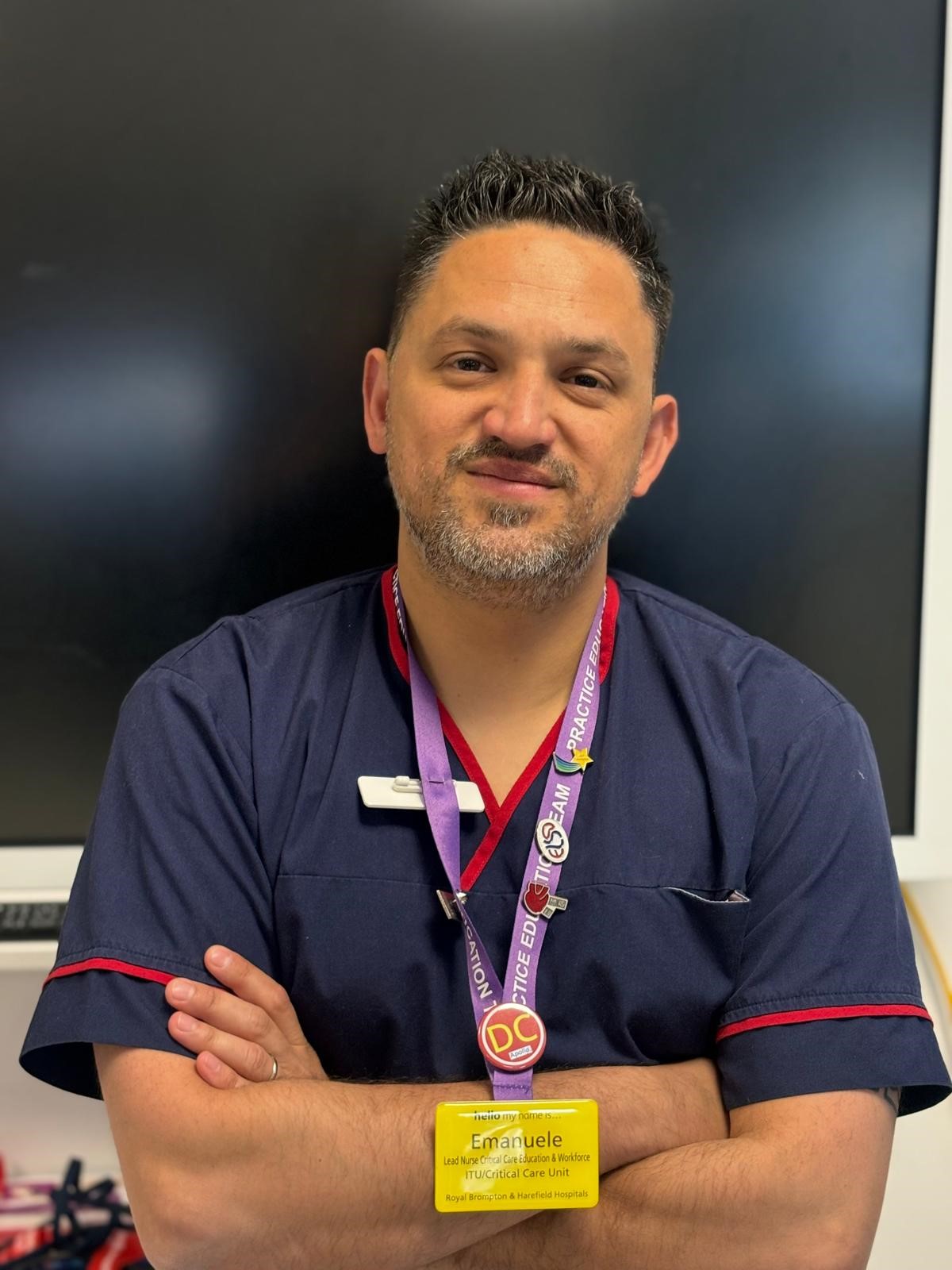What is your career history? Tell us about your nursing journey.
I’m celebrating my 10th anniversary in Harefield this year! I actually started my career as an IT consultant in Italy, where I’m from. But I volunteered with the emergency services at the time – a bit like the St John Ambulance – and I knew caring for people was what I wanted to do. I retrained as a nurse and graduated in 2013.
I first came to the UK in 2014, working as a healthcare assistant in a nursing home in Dorset. Not long after, I saw a job advertised in Harefield’s ITU – I’d read about the pioneering work that Harefield was known for in books as a student. I didn’t get a job in the ITU straightaway, but I did some shifts as a healthcare assistant, and a few months later I was offered a job as a band 5 ITU nurse.
What do you do day-to-day?
There’s no typical day. I lead the critical care education team across ITU, HDU and recovery, which is about 220 nurses. One day I might be handling recruitment – so reviewing job ads, shortlisting candidates, interviewing – on another I might be putting together staff development plans or planning team education days. Some days I will be supporting clinical colleagues with patients. It’s so varied.
On my journey to become a practice educator, I have taken on more academic study, and having obtained an advanced higher education fellowship qualification, I now deliver lectures at universities. With my specialist experience in mechanical life support and Harefield’s reputation in the field, I also attend conferences like the one run by ELSO (Extracorporeal Life Support Organisation) and present posters, hold educational seminars or run simulations.

What’s been your biggest challenge?
Without a doubt, Covid was one of my biggest professional challenges. However, it came at a time in my career when I had plenty of experience in ITU and mechanical life support, as well as enthusiasm to help people, so I channelled that.
We had more patients than we’d ever had on various forms of life support. But I knew I had the knowledge and experience that could help make a difference. I remember thinking, I'm here, this is my job and I'm quite good at my job, so I'm just going to do my very best and get as many people as healthy as possible or give them the best opportunities to get out of here.
The pandemic was a huge learning experience, and from it I’ve taken a lot of lessons I now share with colleagues and students in my role as an educator. Hopefully it's never going to happen again. If it does, we've been there before and we know what to do.
Why did you choose to specialise in critical care education?
I specialised in mechanical life support because it is such an interesting field, particularly with the sort of complex patients we see here at Harefield. As I gained more expertise and experience as I progressed as an ITU nurse, I realised how much I enjoyed mentoring and supporting colleagues. But there are very few educators in this field, which means I can add real value to the profession, and is why I am now pursuing education as my long-term career plan.
What has been the highlight of your nursing career so far?
Probably being recognised for what I do. I attend various conferences throughout the year, and although mechanical life support in critical care is a very specialised topic, it’s a big global community of professionals, and it’s so rewarding when people seek me out. I’m not a professor or anything, but people all over the world have heard of Harefield and will come to hear me share my expertise.
Also leading a very successful team of educators with a great drive for innovation in critical care teaching and training. The practice development team and mechanical life support team have been nominated and won several awards, and lead the way for clinical education in critical care.
What advice would you give to someone considering a career in nursing?
Nursing is about teamwork. People bring different skills and strengths, and teamwork is about bringing the best out of everyone. Surround yourself with people you can learn from, because there's always going to be someone in the team that knows a bit more than you.
There are a lot of opportunities out there too – if you’re new in your career, don't be shy. If there is training available, just go for it. Or if a colleague who does a job you want some day, talk to them about how they got there. I've literally been stealing knowledge from others for the last 10 years!
